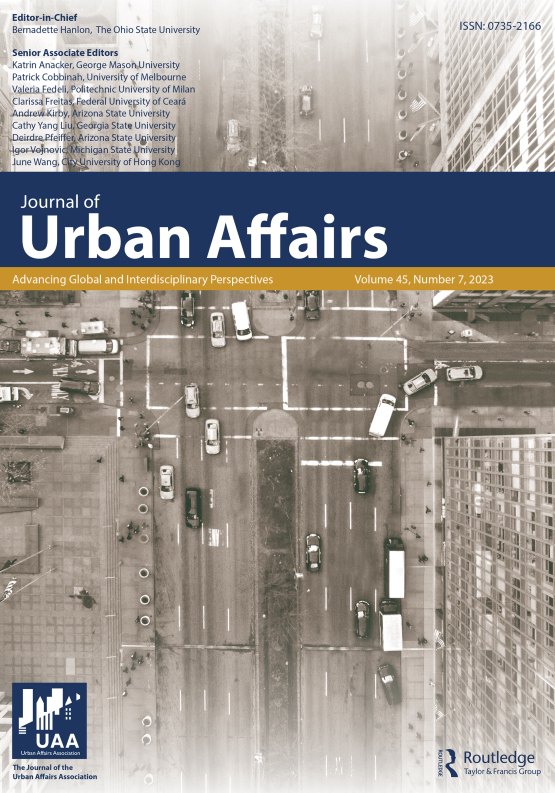Submit a Manuscript to the Journal
Journal of Urban Affairs
For a Special Issue on
Urbicide and the City
Abstract deadline
31 May 2024
Manuscript deadline
20 September 2024

Special Issue Editor(s)
David Coyles,
Ulster University
[email protected]
Urbicide and the City
A body of scholarship has examined the ways in which the materiality and spatiality of urban centers have been willfully disrupted, damaged, and destroyed, as a strategy of military conflict. This ranges from the overt and systematic targeting of key buildings and infrastructures (Kurgan, 2017; Weizman, 2010, 2012) to less obvious regimes of control imposed over the free movement of individuals and their everyday rituals and behaviors (Parsons & Salter, 2008). Also relevant here are examinations of how such military and political influence has steered spatial planning processes to shape urban spaces in ways that are conducive to wider military and political aims, where such practices can again take quite blatant (Yiftachel, 2023) and less obvious (Coyles, Grant & Hamber, 2021) forms.
This call for papers envisages an opportunity to extend this valuable literature by considering how such material and spatial analyses can influence and inform wider urban scholarship. As a departure point, we are therefore broadly conceptualizing urbicide as the willful destruction / transformation of the urban built environment as a political tactic to subvert and disrupt - or perhaps impose and enforce - regimes of political control over the socio-political urban fabric.
Such contributions might include examinations of where such ambitions are being, or have been, pursued through the material destruction of cities through blunt military force. Here, there is the potential to give attention to urban case studies that are familiar, but also to shine a light on other contexts where these events are less visible and less understood. We also see great value in looking beyond more familiar militarized forms of urbicide and encourage potential contributors to help expose how analogous effects can be wrought through the exploitation of the policies and processes governing routine urban development and urban change. For instance, such papers might consider the ways in which the legacy of socio-economic marginalization stemming from the neoliberalized transformation of urban space, and privatization of public space and housing, can be understood as a latent form of urbicide. It could also be similarly conceived that the normalization and destruction of unhoused encampments and informal settlements in urban areas such as San Francisco, might be understood as a visibility of such latent forms of urbicide. Therefore, of interest are manuscripts not only on the forms of urbicide we are witnessing today in cities in Gaza and the Ukraine but also on urbicide in all its varied forms, including urban demolition and community erasure under the auspices of urban regeneration, or, in turn, urban neglect as an erosive force that brings about slow motion urbicide. Also relevant are contributions which explore and reflect upon how cities have undergone, or attempted to initiate, processes of reconstruction and rebuilding in the aftermath of urbicide across its many manifestations.
We welcome conceptual, theoretical, and empirical contributions, which explore and interrogate these themes in their widest sense, across scale, scope, and geography. This call also welcomes both contemporary analyses and historical analyses. We will consider research articles as well as review essays/articles. The manuscripts could aim to answers such questions as:
- What are the material and discursive practices producing urbicide? What are their historical and contemporary forms?
- What overt and covert forms of production are involved in urbicide?
- Who are the communities most affected by urbicide?
- What are the ways in which practices of urbicide can be seen to emerge as a tactic of warfare?
- What are the practices of knowledge production that produce and duplicate the practice of urbicide?
- What urban histories can be seen to have fostered the conditions for urbicide in all its forms and practices?
- How have cities reconstructed and rebuilt post-conflict / post-urbicide? What are the lessons for urban scholarship and practice?
For consideration in the special issue, authors are invited to submit 500-word abstract via email by May 31, 2024. Please send the abstracts and any inquiries about the appropriateness of contribution to Dr David Coyles at [email protected] and Dr. Bernadette Hanlon, the editor of the Journal of Urban Affairs at [email protected]. Scholars will be invited to submit draft manuscripts from a selection of abstracts by September 20, 2024.
Looking to Publish your Research?
Find out how to publish your research open access with Taylor & Francis Group.
Choose open accessSubmission Instructions
For consideration in the special issue, authors are invited to submit 500-word abstract via email by May 31, 2024. Please send the abstracts and any inquiries about the appropriateness of contribution to Dr David Coyles at [email protected] and Dr. Bernadette Hanlon, the editor of the Journal of Urban Affairs at [email protected]. Scholars will be invited to submit draft manuscripts from a selection of abstracts by September 20, 2024.
We welcome conceptual, theoretical, and empirical contributions, which explore and interrogate these themes in their widest sense, across scale, scope, and geography. This call also welcomes both contemporary analyses and historical analyses. We will consider research articles as well as review essays/articles.
Please do not upload manuscripts to the JUA submission site.